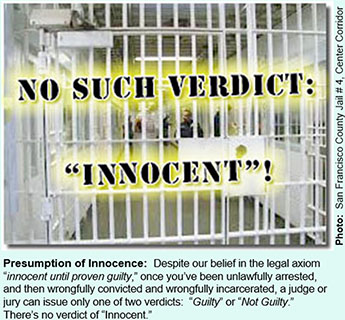 Article in Press Printer-friendly PDF file
Article in Press Printer-friendly PDF fileWestside Observer Newspaper
June 2019 at www.WestsideObserver.com
$53.4 Million Costs of Failure to Sufficiently Reconsider
High Costs of Wrongful Arrests and Convictions
 Article in Press Printer-friendly PDF file
Article in Press Printer-friendly PDF file
Westside Observer
Newspaper
June 2019 at www.WestsideObserver.com
$53.4 Million Costs of Failure to Sufficiently Reconsider
High Costs of Wrongful Arrests and Convictions
by Patrick Monette-Shaw
Can you exonerate the truly innocent in a legal system having binary verdicts available: “Guilty” vs. “Not Guilty”?
Unfortunately, the answer may be “No” in criminal lawsuits once someone has been unlawfully arrested and subsequently wrongfully incarcerated, since there is no verdict of “Innocent.”
I was stuck by this reading Preet Bharara’s book “Doing Justice,” in which he noted “There’s no such thing as a verdict of innocence.”
That’s because “Not Guilty” comes down — in part — to parsing “beyond a reasonable doubt,” such that if there was credible doubt about guilt, then there may be doubt of complete innocence too. Indeed, Not Guilty doesn’t necessarily mean you are innocent. Instead, it means evidence presented at trial wasn’t strong enough for a guilty verdict. Not Guilty only means that a prosecutor failed to prove a defendant was guilty beyond any reasonable doubt.

Innocent means that you did not commit the crime. Not Guilty simply means that there was insufficient evidence to determine that you did commit the crime.
Bharara was the U.S. Attorney for the Southern District of New York from 2009 to 2017, when President Trump fired him. In his book, Bharara recounts several stories of innocent people who had been wrongly accused and forever injured because of a failure to sufficiently reconsider evidence and facts at multiple points in the criminal justice system, leading to injustice against innocent people. Bharara revisits the issue of a failure to sufficiently reconsider several times throughout his book.
 He recounts the case of a man who spent 17 years in Sing Sing prison for a murder he hadn’t committed along with five other defendants who had also been falsely convicted in a second murder. In 2013, the convictions against all six were overturned; the defendants received $3.9 million from the state and New York City paid the wrongfully accused $40 million in 2016.
He recounts the case of a man who spent 17 years in Sing Sing prison for a murder he hadn’t committed along with five other defendants who had also been falsely convicted in a second murder. In 2013, the convictions against all six were overturned; the defendants received $3.9 million from the state and New York City paid the wrongfully accused $40 million in 2016.
It got me thinking about similar wrongful prosecution and incarceration costs in San Francisco.
For those wrongly convicted and then incarcerated, the price of the injustice is high, far beyond the obvious loss of their freedom. And the injustice comes at a high price for taxpayers, too. 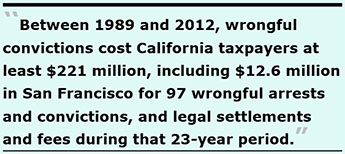
That included $12.6 million in San Francisco for 97 wrongful arrests and convictions, and legal settlements and fees during that 23-year period, through 2012. There’s been additional wrongful convictions and settlements since then.
As the Westside Observer reported last March, San Francisco taxpayers have had to foot the $90.7 million bill for City Attorney time and expenses plus settlement awards in 359 prohibited personnel practice lawsuits brought by City employees involving on-the-job bullying, wrongful termination, harassment, discrimination, and other practices between 2007 and 2018.Wrongful Arrests and Convictions in San Francisco
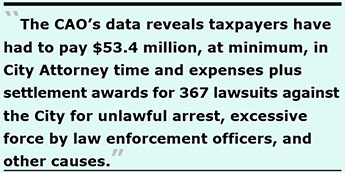 On top of costs to taxpayers for prohibited personnel practice lawsuits brought by City employees, I wondered how much taxpayers have had to shell out for wrongful incarceration lawsuits against the City.
On top of costs to taxpayers for prohibited personnel practice lawsuits brought by City employees, I wondered how much taxpayers have had to shell out for wrongful incarceration lawsuits against the City.
On April 3 a records request was placed to the City Attorney’s Office seeking settlements awarded to plaintiffs, plus the City Attorney’s time and expenses involved in wrongful prosecution, wrongful conviction, and wrongful incarceration lawsuits concluded in San Francisco between January 1, 1990 and December 31, 2018.
The City Attorney’s Office (CAO) responded on April 29, providing an Excel file listing 366 lawsuits, but excluded one pivotal case, which makes it 367. The CAO qualified its response, writing in relevant part:
“We have made a good faith effort to include all cases that may be responsive to your request … but because we do not code cases in the precise way that you identified in your request, we cannot guarantee that every matter listed is responsive to your request, nor can we guarantee that we have included every single matter that is responsive. The attached document is our best effort at providing the most information that may be responsive.”
The CAO’s data reveals taxpayers have had to pay $53.4 million, at minimum, in City Attorney time and expenses plus settlement awards for 367 lawsuits against the City for unlawful arrest, excessive force by law enforcement officers, and other causes — including wrongful conviction and incarceration — in lawsuits filed between February 1995 and October 2018.
Notably, data provided by the CAO shows 20 categories of types of lawsuits, totaling $40.3 million. But the CAO withheld data on the $13.1 million settlement award in the Jamal Trulove lawsuit, because his case is not “fully settled” yet.
Table 1: City Attorney Data by Type of Case
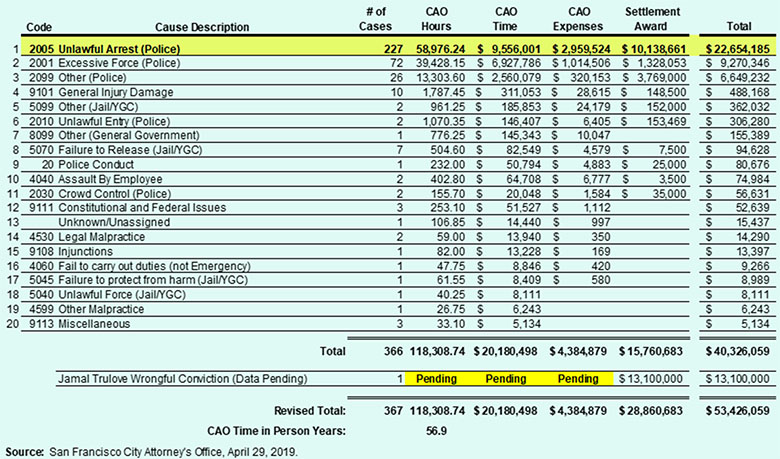
Table 1 illustrates:
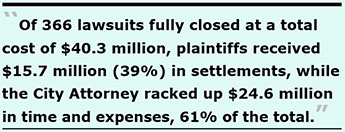 Of the 366 lawsuits fully settled, 227 (62%) involved unlawful arrest, and comprised $22.6 million (56.2%) of $40.3 million in total costs for settlements plus the CAO’s time and expenses.
Of the 366 lawsuits fully settled, 227 (62%) involved unlawful arrest, and comprised $22.6 million (56.2%) of $40.3 million in total costs for settlements plus the CAO’s time and expenses.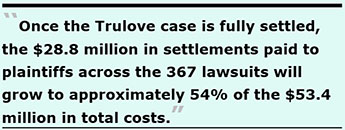
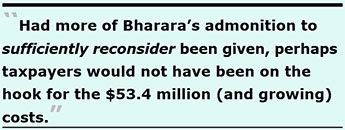
Had more of Bharara’s admonition to sufficiently reconsider been given before unlawfully arresting people and using excessive force,perhaps taxpayers would not have been on the hook for the $53.4 million (and growing) costs!
Four Cases Involving Wrongful Incarceration
Among the lawsuits filed in San Francisco, four men — all African American teenagers at the time of their arrests — were innocent, but wrongfully incarcerated. Costs of their cases involve $30.8 million, and still growing.
Table 2: Costs of Wrongful Incarceration

Table 2 illustrates:

The $30.8 million in taxpayer costs for the three lawsuits involving the four men is probably significantly higher, in part because there’s no data on the costs of pre-trial incarceration prior to conviction and subsequent incarceration.
And the City Attorney’s Office has refused to release data yet on its costs and expenses in Mr. Trulove’s case, despite the fact the Board of Supervisors passed Trulove’s $13 million settlement on first reading on March 19, 2019 and finally passed the settlement on second reading on April 2.
On May 20, the CAO claimed:
“Unfortunately, we cannot provide you with a firm date when [Trulove’s] case will close. Closing a case is an ongoing process that can take time, depending on a variety of factors, and we cannot comment on it further as it is privileged and confidential.”
Why the City Attorney classified Conley’s civil lawsuit against the city as “Other (Police)” but classified the Tennison/Goff lawsuit as an “Unlawful Arrest” isn’t known. It could be because Conley’s 2012 U.S. District Court lawsuit had alleged civil rights violations, rather than unlawful arrest. It will be interesting to learn how the CAO classifies Trulove’s civil lawsuit.
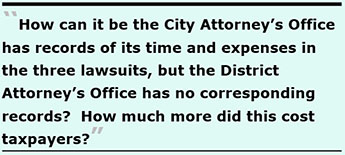
Making the total of unknown costs to taxpayers worse, in response to a records request submitted on May 13 District Attorney George Gascón’s office claimed that following a “reasonable search” for records, it “has no records responsive” regarding its costs, staff time, or expenses involved in the Conley, Tennison/Goff, and Trulove wrongful prosecutions, and Gascón’s office has no duty to create or recreate records of its costs.
How can it be that the City Attorney’s Office has records of its time and expenses in the three lawsuits, but the District Attorney’s Office has no corresponding records? How much more did this cost taxpayers than the known $30.8 million to $53.4 million?
Charges in, and Issues About, the Four Wrongful Incarceration Lawsuits
 Superior Court Judge Marla Miller ruled in December 2010 that Conley was denied a fair trial, and was wrongly and unconstitutionally convicted, in part because material information was not provided to his lawyers. Miller also found that police investigators knew the prosecution’s star witness against Conley had lied, but did nothing to intervene. San Francisco authorities failed to tell Conley’s defense lawyers that the Police Department had paid thousands of dollars to its star witness. The lead police investigator in the case, Earl Sanders — who later became San Francisco’s Chief of Police briefly — knew a witness had committed perjury, but didn’t correct the false testimony. It wasn’t the only case in which Sanders withheld information from defense lawyers, a Brady offense.
Superior Court Judge Marla Miller ruled in December 2010 that Conley was denied a fair trial, and was wrongly and unconstitutionally convicted, in part because material information was not provided to his lawyers. Miller also found that police investigators knew the prosecution’s star witness against Conley had lied, but did nothing to intervene. San Francisco authorities failed to tell Conley’s defense lawyers that the Police Department had paid thousands of dollars to its star witness. The lead police investigator in the case, Earl Sanders — who later became San Francisco’s Chief of Police briefly — knew a witness had committed perjury, but didn’t correct the false testimony. It wasn’t the only case in which Sanders withheld information from defense lawyers, a Brady offense.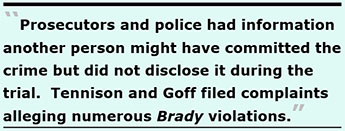 Prison Legal News reported that two SFPD investigators — Earl Sanders and Napoleon Hendrix — had coached the 11-year-old girl who witnessed the shooting until she was able to implicate Goff and Tennison; secretly paid $2,500 to the girl as a cooperating witness; urged her to find a corroborating witness; arranged to pressure a 14-year-old corroborating witness to retract her recantation implicating the two men; ignored witness statements definitively identifying the shooter; and suppressed a video-taped post-trial confession by Lovinsky Ricard, the actual killer.
Prison Legal News reported that two SFPD investigators — Earl Sanders and Napoleon Hendrix — had coached the 11-year-old girl who witnessed the shooting until she was able to implicate Goff and Tennison; secretly paid $2,500 to the girl as a cooperating witness; urged her to find a corroborating witness; arranged to pressure a 14-year-old corroborating witness to retract her recantation implicating the two men; ignored witness statements definitively identifying the shooter; and suppressed a video-taped post-trial confession by Lovinsky Ricard, the actual killer.

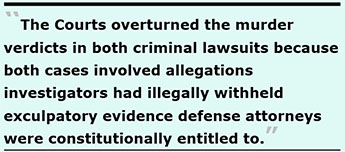 Of note, both the Conley and Tennison/Goff cases involved the same police investigators — Napoleon Hendrix (who has since died) and Earl Sanders, who retired in 2003. The Courts overturned the murder verdicts in both criminal lawsuits because both cases involved allegations that investigators had illegally withheld exculpatory evidence that their defense attorneys were constitutionally entitled to, but were never provided.
Of note, both the Conley and Tennison/Goff cases involved the same police investigators — Napoleon Hendrix (who has since died) and Earl Sanders, who retired in 2003. The Courts overturned the murder verdicts in both criminal lawsuits because both cases involved allegations that investigators had illegally withheld exculpatory evidence that their defense attorneys were constitutionally entitled to, but were never provided.
Although Earl Sanders was clearly involved in wrongly sending Conley, Tennison, and Goff to prison, Sanders now comfortably receives approximately $265,883 each year from his City pension, if not more.
Brady Issues
In the Tennision and Goff lawsuit, the U.S. District court ruled that the prosecutor had a duty to ensure Brady evidence that came to light after conviction was provided to the defendants. That apparently didn’t happen.
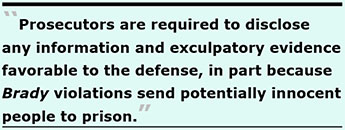
The Brady doctrine is a pre-trial discovery rule based on the 1963 U.S. Supreme Court case, Brady v. Maryland. The Supreme Court ruled prosecutors are required to disclose any information and exculpatory evidence favorable to the defense, in part because Brady violations send potentially innocent people to prison. Brady material is evidence that could negate a defendant’s guilt, could reduce a defendant’s potential punishment, or could relate to the credibility of a witness. Brady disclosure involves evidence that is significant to proving a person’s guilt or innocence.
Dishonest police officers are referred to as “Brady cops” when an officer of the law has a proven record of knowingly lying in an official capacity.
Suppression of evidence favorable to a defendant obviously violates due process. Prosecutors have a duty to establish procedures for the police to inform the prosecutor and defense lawyers about anything (and everything) that may prove the innocence of a defendant.
Brady violations often refers to the failure to disclose exculpatory evidence when there is a reasonable possibility the suppressed evidence could have resulted in a different verdict.
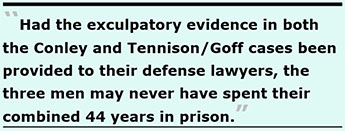
Had the exculpatory evidence in both the Conley and Tennison/Goff cases been provided to their defense lawyers, the three men may never have spent their combined 44 years in prison. And taxpayers could have been spared the $17.2 million in costs in the two cases.
When prosecutors withhold Brady violation evidence, and support Brady cops, they engage in the worst kind of prosecutorial misconduct and violate prosecutorial ethics.
CAO Spokesperson's Callousness
Over the years, City Attorney Office spokespersons have displayed a lot of hubris — in addition to breathtaking callousness — commenting on the lawsuits. In the Tennison and Goff case, Prison Legal News reported that then spokesperson Matt Dorsey said:
“We think the proposed settlements weigh the costs and risks of litigating the case, in addition to the costs that could be incurred on appeal,” said city attorney spokesman Matt Dorsey. “We think financially it’s a good settlement for the city.”
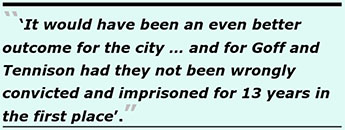
Good for the City? Dorsey’s comment completely ignored the “costs” of the wrongful convictions to Tennison and Goff, who spent 13 years each behind bars for a crime they hadn’t committed and had been framed for. As for the “risks” in litigating the case, Dorsey didn’t mention the $2.8 million in City Attorney time and expenses involved in prosecuting the lawsuit, the $7.5 million in settlements paid to the two defendants, or the $1.3 million estimated costs of incarceration shown in Table 2.
The combined $11.5 million is not a “good settlement” for the City and San Francisco taxpayers! Prison Legal News also reported:
“Of course, it would have been an even better outcome for the city, for San Francisco taxpayers who will foot the bill for the settlement, and for Goff and Tennison had they not been wrongly convicted and imprisoned for 13 years in the first place.” [Emphasis added]
In the Jamal Trulove case, the San Francisco Examiner reported in March 2019 that the now-spokesperson for the City Attorney’s Office, John Coté, claimed:
“We feel this proposed settlement is the best way to resolve this case,” said John Coté, a spokesperson for the office. Had the office not settled, Coté said San Francisco would have been on the hook for more than $15 million after interest.
“Continuing to appeal could have increased that even further, and there were significant legal hurdles to overcome,” Coté said. “Settling this case is the prudent thing to do at this point.”
 Such hubris! The more ‘prudent’ thing to have done — which seems to have escaped Coté’snotice — was to have never wrongly arrested and incarcerated an innocent man — Trulove — to begin with. And the ‘best way to resolve this case’ would have been to never have wrongfully imprisoned him. It could have save taxpayers millions. Since the City Attorney refuses to disclose its full costs in this case, it appears Trulove’s settlement may be still on-going, perhaps at additional costs, which clearly isn’t prudent and may involve over-litigation.
Such hubris! The more ‘prudent’ thing to have done — which seems to have escaped Coté’snotice — was to have never wrongly arrested and incarcerated an innocent man — Trulove — to begin with. And the ‘best way to resolve this case’ would have been to never have wrongfully imprisoned him. It could have save taxpayers millions. Since the City Attorney refuses to disclose its full costs in this case, it appears Trulove’s settlement may be still on-going, perhaps at additional costs, which clearly isn’t prudent and may involve over-litigation.
Failure to Reconsider

Adding insult to injury, after Antoine Goff had been charged with murder in 1990, then served 13 years wrongfully incarcerated, and was released from prison in 2003, and after Tennison and Goff eventually filed a federal lawsuit in April 2004, it took nearly another six years before Goff received his $2.9 million settlement in July 2010, and Tennison received a $4.6 million settlement — 19 years after their belated-justice nightmare began.
Strangely, the City Attorney’s Office claims the Tennison and Goff lawsuit was finally “settled” on August 21, 2014 — four years later! Why did the CAO take another four years to officially settle that case? Will it take another four years to finally settle the Trulove case?
Bharara reminds us people’s understanding of the truth — whether about the correctness of a fact, or the guilt of a person — should never be unalterable. That includes sufficiently reconsidering the full costs of wrongful convictions. We need to put ourselves in Conley’s, Tennison’s, Goff’s, and Trulove’s shoes: Combined, they spent a half century wrongly incarcerated for crimes they didn’t commit.
Costs of sending the wrong people to prison for crimes they hadn’t committed clearly don’t include the costs of allowing those who did commit the crimes to continue roaming our streets.

In the end, San Francisco taxpayers will end up forking over well upwards of $53 million because police officers hadn’t gotten it right. A cast of prosecutors, judges, defense lawyers, district attorneys, and jurors also didn’t get it right, because of their combined failure to sufficiently reconsider. And the failure to reconsider shattered these innocent men’s lives.
Monette-Shaw is a columnist for San Francisco’s Westside Observer newspaper, and a member of the California First Amendment Coalition (FAC) and the ACLU. He operates stopLHHdownsize.com. Contact him at monette-shaw@westsideobserver.com.